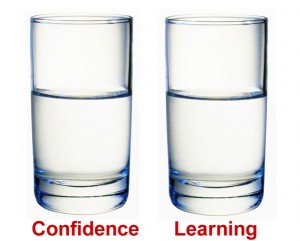Jeff Gothelf and Josh Seiden, in their book on Lean UX, describe how founders often operate in a “reality distortion field”. They recognize that it takes a nearly unrealistic level of confidence to form a new & innovative business venture.
Startup founders must look past the dismal odds of success, the competition, the promise of long hours and crushing expenses. They have to be so confident in their vision that they can quit their day jobs. They must have the confidence to encourage others to either quit their day jobs or posssibly even invest their cash in an untested venture. To have this sort of passion and confidence is infectious.
The lean challenge is to maintain this level of confidence while rigorously testing the assumptions in your plan. In a startup, identifying and questioning assumptions can seem like a waste of time or maybe even contrary to the goal of building a shared vision for the team. How do we overcome this paradox?
How do we enable our startups to thrive on a culture of confidence and success while ensuring we gather, evaluate and improve on input from real customers?
F. Scott Fitzgerald once said “The test of a first-rate intelligence is the ability to hold two opposing ideas in mind at the same time and still retain the ability to function.” Two Thirds of successful tech ventures report having started with very different plans than we know them for today. Groupon, Facebook, Flickr, Microsoft founders all sarted with different visions than the businesses that brought them fame and fortune. Obviously their founders possessed this ability to hold 2 contrary ideas simultaneously in their busy brains. “I am going to be a huge success. But I also need to test my assumptions, listen to the market and improve on my plan.”
We must create a culture of great confidence based on the wisdom that the market is constantly changing. E7 startups adopt the habits and process of build-measure-learn to create products that will be as important to customers as they are in the minds of their founders.

